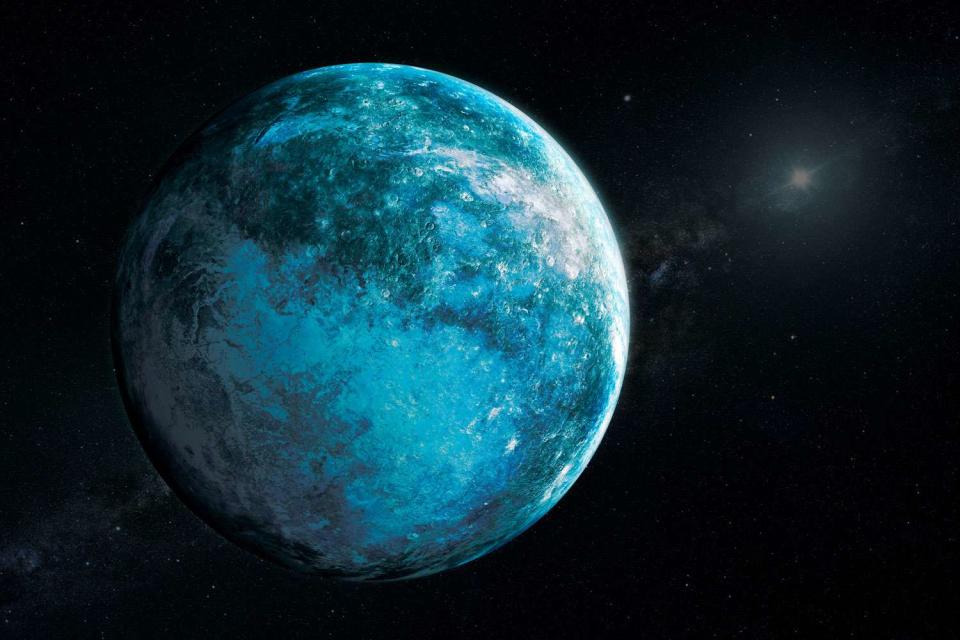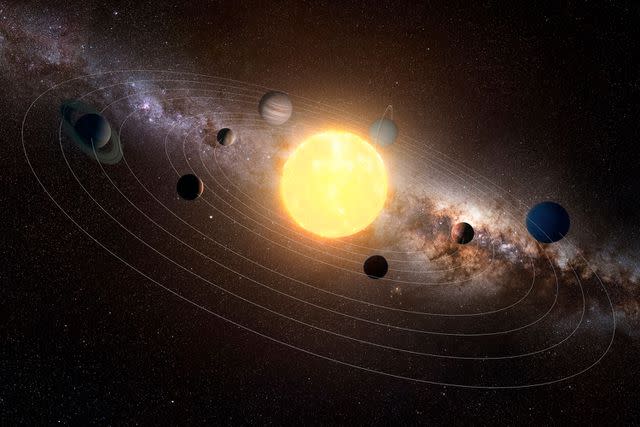Unknown Planet May Exist in Our Solar System, Experts Say
Astronomers have been searching for evidence that Planet Nine exists for years

Tobias Roetsch/Future Publishing via Getty
Artist rendering of the proposed Planet Nine.Researchers have found more evidence that there is an unknown planet in our solar system.
Astronomers have been searching for proof that Planet Nine — also known as Planet X — exists for years now. However, according to a recent study, "a new line of evidence supporting the existence" of the planet, thought to be circling the Sun in an orbit past Neptune, has now been discovered.
It's been reported that the as-of-yet undiscovered planet would help explain the unusual orbits of a series of objects on the edge of our solar system, The Independent reported.
Astronomer Konstantin Batygin and his team wrote about their findings in a new study, which was uploaded to arXiv on April 17. The work focuses on a "more conventional class" of trans-Neptunian objects (TNOs), meaning any minor planet orbiting the sun at a greater average distance than Neptune.
The study looks further into objects that have crossed Neptune and how the orbits were affected, taking into consideration things like the Galactic tide and passing stars, per the outlet.

Getty
A stock image of the solar systemRelated: Must-See Photos from Today's Incredible Eclipse
"The solar system’s distant reaches exhibit a wealth of anomalous dynamical structure, hinting at the presence of a yet-undetected, massive trans-Neptunian body — Planet 9," the study abstract states.
"Previous analyses have shown how orbital evolution induced by this object can explain the origins of a broad assortment of exotic orbits, ranging from those characterized by high perihelia to those with extreme inclinations," the study adds.
Elsewhere in the study, it states that the team's "calculations show that the distribution of the observed orbits strongly supports the presence of the unseen planet."
Despite the planet not yet being discovered, the team has high hopes for the Vera C Rubin Observatory, which is currently under construction in Chile.
Related: What Happens If You Look at a Solar Eclipse Without Glasses?
"With an 8.4-meter mirror and the largest camera ever built for astronomy and astrophysics, Vera C. Rubin Observatory will capture the cosmos in exquisite detail and help answer some of our biggest questions about the Universe," the observatory's website confirms.
“This upcoming phase of exploration promises to provide critical insights into the mysteries of our solar system’s outer reaches,” Batygin and his team conclude in the study.
The study comes after Michael E. Brown, who was also credited with the recent study, spoke about where Planet Nine is likely to be.
"We have ruled out most of the places where the planet could be," the astronomer told Live Science earlier this year. "Now we have to do the much harder job of searching the area that is further away."
Never miss a story — sign up for PEOPLE's free daily newsletter to stay up-to-date on the best of what PEOPLE has to offer, from celebrity news to compelling human interest stories.
Brown pointed out that "there are many things in the sky that change month after month," like asteroids and comets.
"As a result, it's like playing a game of connecting the dots in a very computationally intensive way," Brown added.
For more People news, make sure to sign up for our newsletter!
Read the original article on People.

 Yahoo News
Yahoo News 
